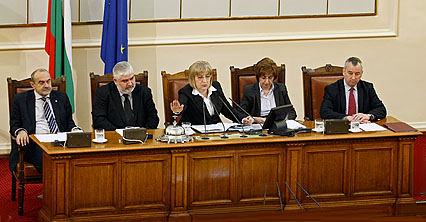
The supplementary remuneration paid to civil servants for accomplishments achieved on the job would not surpass 80% of their basic yearly salary, the parliament decided. It will be paid 4 times annually, based on evaluations the rules of which are to be set up in a special Ordinance. The members of parliament passed at second reading the amendments to the Civil Servants Act. The act sets up a new structure of their salary, abolishing the supplementary payment for length of service. The Deputy Finance Minister Vladislav Goranov explained that the new rules are not to decrease the amount of the current remunerations received by civil servants. The net remuneration will consist of basic salary and supplements for overtime and night work, for work on holidays, on call and for particular results achieved on the job. The individual amount of the salary will take into account the level of the position held, the qualifications and the professional experience. The expenditures allocated for additional remunerations will not surpass 30% of those for salaries, supplements and mandatory insurance (social and health) contributions from the budget of the state administrations spending units.
The parliament decided that the civil servant will have a 7 days term to appeal the evaluation received. The amendments to the Civil Servant Act voted at second reading were moved by the Council of Ministers. Everyone in the administration who served at least six months in one calendar year undergoes evaluation for the position held. It is performed by the supervisor to whom the employee is directly subordinated. On his part the supervisor has to write down and explain the evaluation and submit it to the upper level control body. The civil servant has the right to know the content of the evaluation. The career growth of the civil servant depends on the annual assessments of the performance on the position held. The junior civil servants will get promotions after 2-3 yearly successive evaluations, the seniors after 3-4 evaluations. The assessment will consider the attainment of the preliminary objectives set by the employee, the execution of the everyday tasks and requirements of the employer and the demonstrated competence.
The civil servant is entitled to a single compensation before retirement at the amount of 6 basic salaries, if he has worked in the same administration for at least 10 years. If he has worked less, the compensation will amount to 2 basic salaries. The civil servant can be sent temporarily by his administration to serve in another administration for a term of up to 2 years. The mission can be extended only once with the written consent of the employee.

- 22/04/2021
The Parliament imposed a moratorium on concessions, real estate deals and appointments pending the election of a new cabinet or caretaker government - 16/04/2021
By 156 votes “in favour”, the National Assembly accepted the resignation of the Council of Ministers with Prime Minister Boyko Borisov - 15/04/2021
Speech by Mrs. Iva Miteva upon her election as a President of the 45th National Assembly - 15/04/2021
The Member of Parliament Iva Miteva was elected President of the 45th National Assembly - 15/04/2021
The Members of the 45th National Assembly were officially sworn in - 03/03/2021
The President of the National Assembly Tsveta Karayancheva and MPs attended the solemn fireworks-retreat on the occasion of the Liberation of Bulgaria - 03/03/2021
Every Bulgarian should preserve and honour the memory of those glorious ancestors, thanks to whom Bulgaria exists today, said the President of the National Assembly Tsveta Karayancheva in Gabrovo - 03/03/2021
Today we are on Shipka to pay our respects to all the heroes who sacrificed their lives for freedom, said the President of the National Assembly Tsveta Karayancheva after climbing Shipka Peak together with young people from all over the country - 02/03/2021
The Vice-President of the National Assembly Valeri Simeonov received an award from the Bulgarian Republican Self-Government in Hungary - 26/02/2021
The Parliament adopted at second reading amendments to the Measures Against Money Laundering Act
 Български
Български English
English